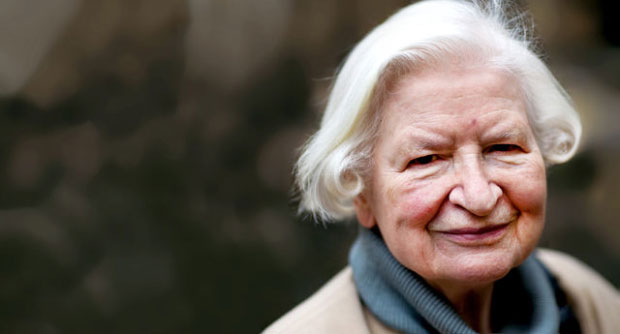P.D. James died today at the age of 94. She was a great friend of The Spectator. Here is her diary from 27 January 2010:
Our protracted family Christmas with my elder daughter, Clare, came to an end when her son, with his Australian wife and two children, returned to Melbourne. The visit has been a great success, particularly so for Clare, whose idea of a perfect Christmas is to have four generations round the table. The snow was a bonus since neither great-grandchild had ever before seen snow. The first glimpse of a totally white England spread out beneath them as the plane descended to Heathrow was a wonder, and getting close to this marvellous glittering stuff and actually playing with it never palled. Only when the thaw began did my four-year-old great-grandson ask his father, ‘Daddy, when are we going back to our own planet?’
One of the pleasures of being a great-grandmother is to see the joy of one’s children at being grandparents, but grand-parenting has changed. Now there are thousands of grandparents who take on the whole care of a grandchild so that the mother can work, more often from necessity than personal choice. This may be a continual pleasure for younger, healthy and maternal grandparents, but it must occasionally be exhausting. The relationship between grandparents and grandchildren is one of the most rewarding in family life and the government is no doubt correct to ensure that grandparents have the right of access. But if an absent father or a grandparent can only have access to a child by invoking the law, and if their meetings are overlaid by resentment, rancour or parental quarrelling, surely the encounter will only do harm. Governments tend to believe that social evils can be cured by money or legislation, but they are wrong. What children want is for their parents to love each other, and if that is no longer possible, at least to act with kindness. Perhaps what we need is more education for parenthood, beginning in schools.
A recent prize-giving has awakened my interest in discovering the definition of a literary novelist. I can define, at least for my own satisfaction, what is meant by a literary publisher: that is, one who would never publish a book he or she would be ashamed to be seen reading on the Underground. But defining a literary novel is beyond me. There are no sour grapes about this inquiry since only the most fragile egos would be bruised by omission from this mysterious category. Does the secret lie in the subject matter? It seems not, although a high proportion of literary novelists are apparently attracted to post-colonial stories, the recent or remote past, or fantasy. Does the distinction lie in literary style? Certainly a few literary novelists develop a style which makes demands on the reader’s comprehension, but others write with exemplary clarity and grace. That said, I doubt whether P.G. Wodehouse has ever been regarded as a literary novelist. Today Mr Ishiguro is a literary novelist, and Mr Le Carré is not — or so it appears. I doubt whether either writer is much concerned either way, but why does this difference arise and who decides? Once awarded the accolade, by whatever method, it seems that the distinction is never lost, and however disparaging or hostile the reviews of subsequent books may be, a literary novelist apparently remains so for life.
I have been indulging in my annual re-reading of Jane Austen and it has struck me — strangely, for the first time — that not one of her five heroines has a satisfactory mother. Mrs Bennet is a disaster, over-indulgent to her favourite daughter, Lydia, and a constant embarrassment to Jane and Elizabeth. It could be said in her defence that in one respect she is a better parent than Mr Bennet. She does realise the total ignominy which would follow his death without at least one daughter having married well: removal to a cottage on the Longbourn estate and reliant on the charity of Mr Collins and Charlotte. Mrs Dashwood is charming but gravely irresponsible as a mother. Her refusal, despite all Elinor’s pleading, to ask Marianne about her relationship with Willoughby, could have resulted in her daughter’s ruin and did indeed nearly cause her death. Mrs Musgrove is affectionate but silly.
Indeed Jane Austen, somewhat unfeelingly, invites us to join her in despising the poor woman’s loud lamenting over her dead son, whom no one had greatly cared about during his life. Perhaps we should not expect too much of Mrs Morland, with ten children to bring up, but she was unwise to let Catherine go for a protracted stay at Northanger Abbey to a family she herself had never corresponded with or met. (General Tilney and Mrs Norris are arguably Austen’s only complete villains.) Emma Woodhouse and Anne Elliot lost their mothers when young. But in leaving her heroines without the wisdom, affection and guidance of a sensible mother, Jane Austen was artistically right. A book can only have one heroine and each of the novels has the same basic plot, the story of a virtuous and attractive woman who overcomes difficulties, including the lack of a mother, to win the husband of her choice. In other words, Mills & Boon written by a genius.





Comments